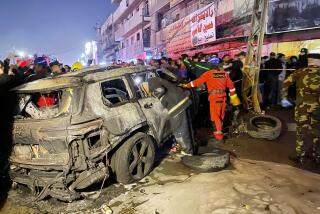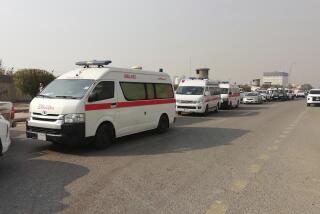U.S. airstrike kills suspect in bombings
- Share via
BAGHDAD — A U.S. airstrike killed a man suspected of directing the Aug. 14 truck bombings in northern Iraq that caused the deaths of more than 400 people, the deadliest single attack since the American-led invasion of Iraq in 2003, military officials said Sunday.
The man, Abu Mohammed Afri, was a leader of Al Qaeda in Iraq, U.S. officials said, and was responsible for the synchronized bombings that targeted the Yazidi religious sect, a minority that is neither Muslim nor Christian.
The bombings leveled neighborhoods of crude earthen homes and shops, burying victims and overwhelming medical facilities in Nineveh province. Hundreds of others were wounded, and hundreds of homes were destroyed.
Iraqi and U.S. officials said the coordinated detonations of four trucks bore the trademark of Al Qaeda affiliates. Many Muslims view the Yazidis as nonbelievers for following pre-Islamic beliefs that reference Christianity and Islam. Yazidis hold divine an archangel that some Muslims contend is Satan.
Afri was reportedly spotted while driving Sept. 3 in a remote area about 70 miles southwest of Mosul in northern Iraq. He and his driver were killed by fixed-wing aircraft. Afri was identified by “close associates and detainees,” according to a U.S. military statement, but officials did not reveal the evidence linking him to the bombings.
“This doesn’t bring back the hundreds of innocent Iraqis who were killed in the vicious Nineveh bombings, but the death of Abu Mohammed Afri does bring justice to many families,” said Maj. Winfield Danielson, a U.S. military spokesman.
Farther south, a mob of masked and armed men attacked a police station in Hajaj, about 25 miles north of Tikrit, early Sunday. Leaders of the predominantly Sunni area established the police station in the last year after seeking greater cooperation with U.S. military authorities.
At least three police officers were killed before nearby residents, many of them armed, drove off the attackers, according to police officials in nearby Baiji. Ten of the assailants were reported killed and part of the police station was destroyed.
Three more police officers were reported killed and four injured Saturday night by a bomb targeting a police station in Balad, about 50 miles north of Baghdad. The slain officers were members of a police brigade assigned to protect the Askariya Shrine in Samarra, police said.
U.S. military officials reported a soldier killed Sunday and two others injured during combat operations in west Baghdad.
A meeting of Iraqi government leaders and representatives from neighboring countries, as well as officials from the U.N. and the Group of 8 industrialized countries, wrapped up Sunday with little progress beyond an agreement to meet again in Istanbul, Turkey.
The session was the second since an inaugural meeting in March to discuss Iraq security, energy and the plight of nearly 2 million Iraqi refugees who have fled the violence in their country.
Iraqi Foreign Minister Hoshyar Zebari asked neighboring nations to help keep militants from entering Iraq, warning that “the fires they are starting here” could spread to their countries. “Those who interfere in Iraqi matters should keep their hands away and leave it to the Iraqis to decide their own destiny,” he said.
Though falling short of any breakthroughs, Zebari said completion of the meeting without trouble was in itself significant.
“This international meeting in Baghdad, at this time, shows that Iraq is still functioning, still working,” he said, “despite all the bad images in the media and the international media.”
Police in Baghdad, meanwhile, recovered a dozen bodies Sunday from different parts of the capital. The men appeared to have been killed by gunfire.
--
Times staff writers Saif Rasheed, Raheem Salman and Wail Alhafith in Baghdad and special correspondents contributed to this report.
More to Read
Sign up for Essential California
The most important California stories and recommendations in your inbox every morning.
You may occasionally receive promotional content from the Los Angeles Times.













